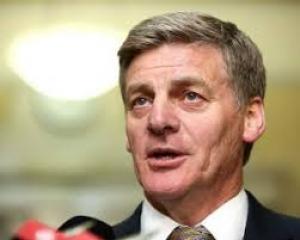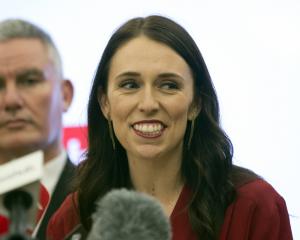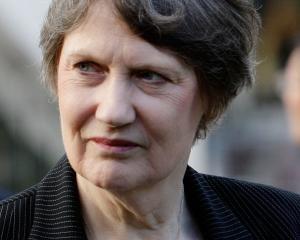
Anson Chan was talking about engagement with Hong Kong and its domineering master, China, which, she said, under Xi Jinping, is not upholding the 1997 ``one-country-two-systems'' undertaking when it took over the territory.
She and colleague Martin Lee said it was ``in the interests of New Zealand'' and other democracies that democracy succeeds in Hong Kong.
They warned that ``if you roll over and pull punches you will have no respect from Beijing''. On that reading, Beijing's attack on New Zealand's moderate South China Sea stance was respect. Bill English's abrupt cancellation of a meeting with Ms Chan and Mr Lee because Murray McCully was in Beijing looked like roll-over.
Apply the Anson-Lee test to John Key's state visitor and rugby test companion last week, Frank Bainimarama, Fiji's military thug ruler.
Mr Key insisted last week he still disagreed with Mr Bainimarama's seizing power by ``assuming authority through the barrel of a gun'' (his 2000 and 2006 coups). In June, when Mr Key visited Fiji, Mr Bainimarama railed at New Zealand's and Australia's post-coup sanctions.
New Zealand's terms of engagement are to encourage Mr Bainimarama's shuffle back to democracy and counter China's growing influence.
This week, Mr Key is in India, pursuing an elusive free trade deal with Prime Minister Narendra Modi but, importantly, also widening the terms of engagement to other matters, including India's key role in increasingly edgy geopolitics. Two Asia Foundation reports this month sketch those wider interests.
Mr Key is also welcoming the first United States warship visit after a 32-year anti-nuclear frost. His terms of engagement include maintaining the anti-nuclear policy but no longer requiring a specific formal United States statement the ship is not nuclear-armed or nuclear-powered. New Zealand officials make that call.
China, India, the US: small countries need goodwill from big countries - and always in an asymmetric relationship.
That asymmetry has coloured the transtasman relationship from the 1830s. It will hang over the Australia New Zealand Leadership Forum of businesspeople, officials and ministers on Friday in Sydney.
In its early meetings from 2004 the forum traversed the whole relationship. Now it focuses tightly on the economic part, essentially on building a ``single economic market'' (SEM) in which doing business in one country would be closely similar to doing business in the other.
Momentum has slowed, in part because many do-able big steps were taken early. Australia annually rules out mutual recognition of imputation/franking credits on company dividends, even though both countries would gain from such a move.
Nevertheless, more than 20 items have been agreed since 2010, 12 in the past two years, some significant such as equivalent consumer credit requirements and enforcement, comparable financial product disclosures and alignment of qualifications.
Mr English and Treasurer Scott Morrison will highlight on Friday an Australia New Zealand Infrastructure Pipeline online portal for above-$100million infrastructure projects in the next 10 years (currently including 35 New Zealand ones), aimed at foreign investors and major infrastructure companies. Friday's forum will again suggest action points, focused on tourism, agriculture, innovation, health technology and indigenous business. On the last, New Zealand has a lot to teach Australia if it can hear.
A simultaneous meeting of ministers will aim to jump-start more action, including an SEM focus in the Prime Ministers' annual February meetings.
But a caution: this decade, Australia has seldom done SEM things that do not independently rank high on its policy agenda. That's asymmetry in action.
One non-business item that has climbed up Australia's agenda is to import Bill English's world-unique ``social investment'' scheme. Federal Human Services Minister Alan Tudge and the New South Wales Premier's department have been keenly examining it.
Other Australians admire Mr English's economic management. They include many business leaders. The same might be said of returning part-time-Australian New Zealanders who have paid taxes there and now expect free social services here.
Australia has a tougher line on social services - and non-citizen ex-criminals - as many ex-New Zealand Australia-dwellers have found.
And it locks up refugees from elsewhere in conditions akin to the post-1788 concentration camps that welcomed most of Australia's first arrivals from Britain.
That has posed a challenge to New Zealand. Amnesty International found evidence of torture of refugees and produced a poll which found 79% of New Zealanders want Mr Key to take a tough stance with Malcolm Turnbull on that.
Ahem. Do the ``terms of engagement'' with our ``mates'' stretch that far? Mrs Chan's experience with Mr English might be a clue.
Colin James is a leading social and political commentator.












